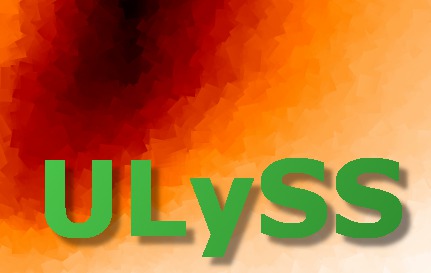
|

|
;+ ; NAME: ; MREGRESS ; ; PURPOSE: ; Perform a multiple linear regression fit ; ; USAGE: ; Result = MREGRESS(X, Y, $ ; MEASURE_ERRORS=measure_errors, $ ; SIGMA=sigma, $ ; INVERSE=inv, $ ; STATUS=status) ; ; ARGUMENTS: ; X: (Input) The array of independent variable data. X must ; be dimensioned as an array of Npoints by Nterms, where ; there are Nterms coefficients (independent variables) to be ; found and Npoints of samples. ; Note that this array is transposed with respect to the ; input of the IDL routine REGRESS. ; ; Y: (Input) The vector of dependent variable points. Y must have ; Npoints elements. ; ; ; KEYWORDS: ; MEASURE_ERRORS : Set this keyword to a vector containing standard ; measurement errors for each point Y[i]. This vector must be the same ; length as X and Y. ; ; For Gaussian errors (e.g. instrumental uncertainties), MEASURE_ERRORS ; should be set to the standard deviations of each point in Y. ; For Poisson or statistical weighting MEASURE_ERRORS should be ; set to sqrt(Y). ; ; SIGMA : Set this keyword to a named variable to recieve the errors ; on the returned coefficients ; ; INVERSE : Set this keyword to a named value to receive the structure ; containing the covariance matrix and other terms that can be re-used ; to solve the system with the same X and other Y. ; ; STATUS : Set this keyword to a named variable to receive the status ; of the operation. Possible status values are: ; - 0 for successful completion, ; - 1 for a singular array (which indicates that the inversion ; is invalid), and ; - 2 which is a warning that a small pivot element was used ; and that significant accuracy was probably lost. ; If STATUS is not specified then any error messages will be output ; to the screen. ; ; RETURN: ; MREGRESS returns a column vector of coefficients that has Nterms ; elements. ; ; DESCRIPTION: ; Adapted from the IDL program REGRESS ; ; Perform a multiple linear regression fit: ; Y[i] = A[0]*X[0,i] + A[1]*X[1,i] + ... + ; A[Nterms-1]*X[Nterms-1,i] ; ; This is a variant of the IDL funtion REGRESS, where the ; covariance matrix and other intermediate arrays can be saved ; to solve faster the system with successive values of Y and ; the same X. ; An noticeable difference is also that MREGRESS does not ; include a constant term (if necessary, the constant may be ; included as one of the terms of X). ; ; HISTORY: ; Written, Ph. Prugniel 2008/01/17 (from the IDL REGRESS) ;- ; CATEGORY: ULY_UTIL ;------------------------------------------------------------------------------ FUNCTION mregress,x,y, $ MEASURE_ERRORS=measure_errors, $ SIGMA=sigma, $ INVERSE=inv, $ STATUS=status COMPILE_OPT idl2 ON_ERROR,2 ;Return to caller if an error occurs sy = SIZE(Y) ;Get dimensions of x and y. sx = SIZE(X) ndimX = sx[0] nterm = (ndimX EQ 1) ? 1 : sx[ndimX] ; # of terms (coefficients) nptsX = sx[1] ;# of observations (samples) npts = sy[1] ;# of observations (samples) IF (nptsX NE npts) THEN MESSAGE, $ 'X and Y have incompatible dimensions.' IF (ndimX EQ 1) THEN x = REFORM(x, npts, 1, /OVER) ; change X to a 2D array nfree = npts-1 ;degs of freedom invert = 0b if n_tags(inv) gt 0 then if (size(inv.wx))[1] ne (size(y))[1] then invert = 1b statarith = check_math(MASK=32) ; mregress may cause an underflow: harmless, handle/ignore if n_tags(inv) le 0 or invert then begin weights = 1/measure_errors^2 sw = TOTAL(weights)/npts weights = weights/sw wgt = REBIN(weights,npts,nterm) ; This commented block is the version with a constant term ; xmean = TOTAL(wgt*x,1, DOUBLE=double) ; if (nterm gt 1) then $ ; xx = x - REBIN(transpose(xmean),npts,nterm) $ ;x(j,i) - xmean(i) ; else xx = x - xmean ; wx = TEMPORARY(wgt) * xx ;weights(i)*(x(j,i)-xmean(i)) ; sigmax = SQRT(TOTAL(xx*wx,1)/nfree) ;weights(i)*(x(j,i)-xm)*(x(k,i)-xm) ; ar = matrix_multiply(wx, xx, /ATRANSPOSE)/(nfree * sigmax #sigmax) wx = TEMPORARY(wgt) * x ;weights(i)*x(j,i) sigmax = SQRT(TOTAL(x*wx,1)/nfree) ;weights(i)*x(j,i)*(x(k,i)-xm) ar = matrix_multiply(wx, x, /ATRANSPOSE)/(nfree * sigmax #sigmax) ar = INVERT(ar, status) IF (status EQ 1L && ~ARG_PRESENT(status)) THEN BEGIN IF (ndimX EQ 1) THEN x = REFORM(x, /OVER) ; change X back to a vector MESSAGE, "Inversion failed due to singular array." END IF (status EQ 2L && ~ARG_PRESENT(status)) THEN BEGIN MESSAGE, /INFO, $ "Inversion used a small pivot element. Results may be inaccurate." endif ; error terms sigma = ar[LINDGEN(nterm)*(nterm+1)]/(sw*nfree*sigmax^2) neg = where(sigma lt 0, cnt) ; may have sigma^1<0 if small pivot if cnt gt 0 then sigma[neg] = 0 sigma = sqrt(sigma) inv = {a:ar, ww:weights, wx:wx, sx:sigmax, sigma:sigma} endif ; this commented block is the version with constant term ;ymean = TOTAL(y*inv.ww) ;y mean ;yy = y-ymean ;sigmay = SQRT(TOTAL(inv.ww * yy^2)*npts/nfree) ;weights*(y(i)-ymean) ;correlation = matrix_multiply(inv.wx, yy, /ATRANSPOSE) / (inv.sx * sigmay * nfree) sigmay = SQRT(TOTAL(inv.ww * y^2)/nfree) ;weights*y(i) correlation = matrix_multiply(inv.wx, y, /ATRANSPOSE) / (inv.sx*sigmay*nfree) a = (correlation # inv.a)*(sigmay/inv.sx) ;get coefficients ;yfit = matrix_multiply(a,x, /BTRANSPOSE) ;compute fit ;const = ymean - TOTAL(a*xmean) ;constant term ;yfit = yfit + const ;add it in IF (ndimX EQ 1) THEN x = REFORM(x, /OVER) ; change X back to a vector if statarith eq 0 then statarith = check_math(MASK=32) return, a END ;--- end ---